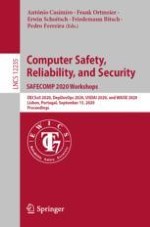2020 | OriginalPaper | Buchkapitel
A Framework for Building Uncertainty Wrappers for AI/ML-Based Data-Driven Components
verfasst von : Michael Kläs, Lisa Jöckel
Erschienen in: Computer Safety, Reliability, and Security. SAFECOMP 2020 Workshops
Aktivieren Sie unsere intelligente Suche, um passende Fachinhalte oder Patente zu finden.
Wählen Sie Textabschnitte aus um mit Künstlicher Intelligenz passenden Patente zu finden. powered by
Markieren Sie Textabschnitte, um KI-gestützt weitere passende Inhalte zu finden. powered by
